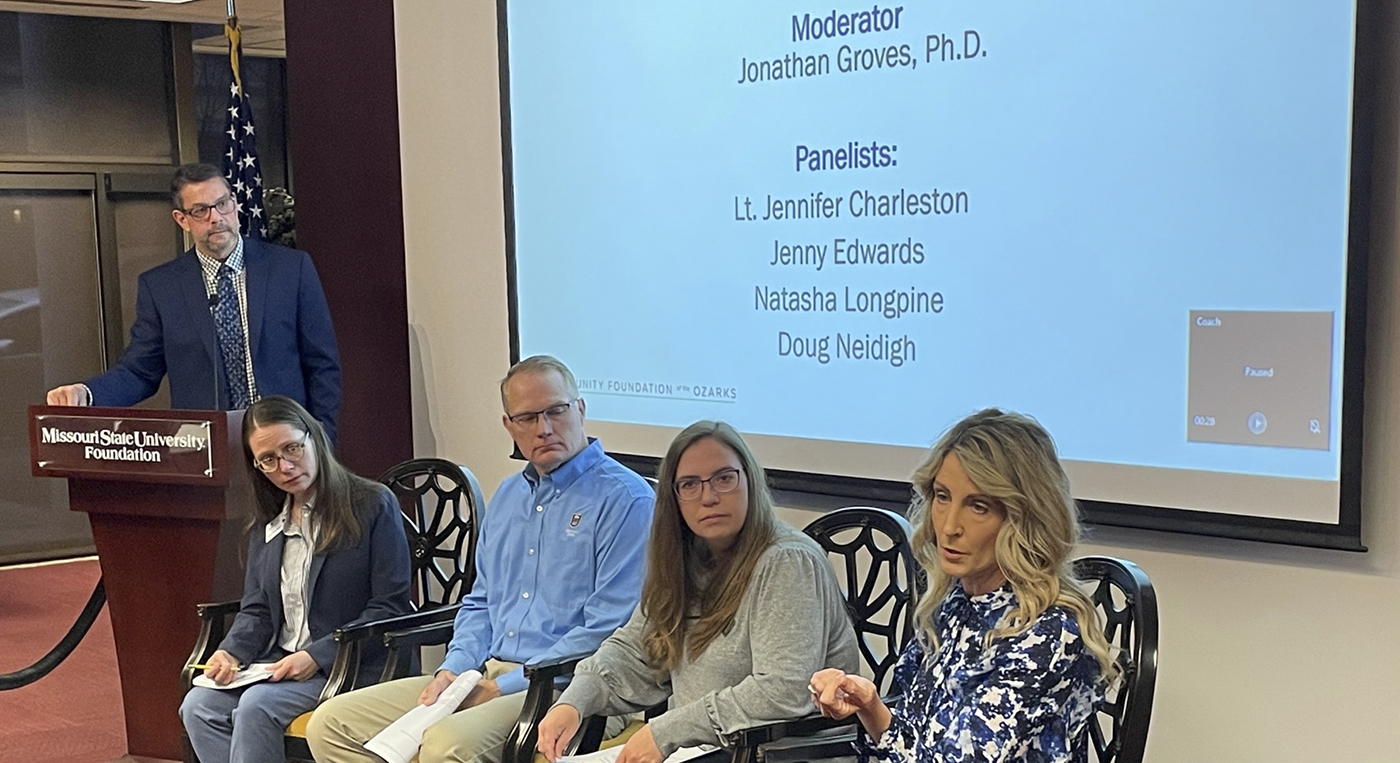Could cameras and audio technology in neighborhoods help reduce crime? Can more parks lead to safer neighborhoods? How can we make bus schedules more efficient so riding public transit takes a similar amount of time as driving a car across town? How can we get more private businesses involved in environmental sustainability efforts?
These ideas and many more were part of a recent community discussion aimed at fostering connections to address issues in Springfield and Greene County.
The meeting March 30, hosted by the Community Foundation of the Ozarks and the Darr Family Foundation, is part of the latest in a long series of community improvement efforts stemming from the Community Focus Report for Springfield and Greene County.
The biennial report, including its most recent 2021 edition, provides a clarion call for local people committed to improving the quality of life for residents in our area.
And the report is a key part of our public affairs reporting agenda here at the Hauxeda. More on that in a bit.
Register for upcoming sessions
The Network for Progress series will include four more sessions exploring the Red Flags and Blue Ribbons outlined by the 2021 Community Focus Report. Upcoming sessions (each running from 8:30 to 10:30 a.m.) and topics to be addressed include:
- April 27 — Education Access & Quality
- May 25 — Social & Community Context
- June 15 — Economic Stability
- July 27 — Health Care Access & Quality
You can find more information and register for sessions on the Focus Report website.

‘Intentional time to dream'
Heather Zoromski, executive director of the Darr Family Foundation, said the series of meetings is designed to “extend the life and impact of the Community Focus Report.”
She said the workshops are designed to give “involved organizations and people intentional time to dream, network and plan to effectively move the needle in a positive direction on identified red flags and continue to sustain blue ribbons.”
The Darr Foundation sees much of its work as “aligned with the Community Focus Report and it is important to us to see those identified issues being tackled,” Zoromski said.
Likewise, at the Daily Citizen, our work is aligned with the Focus Report and part of that stems from my own experience when I first moved to Springfield in 2010 to become executive editor of the local newspaper.
Someone shared with me a copy of the 2009 Community Focus Report, and I had never seen anything like it in my previous stops as an editor in Wisconsin, Nebraska, Iowa and Arizona.
The 2009 report highlighted some perennial “red flag” issues, such as high rates of child abuse and neglect, concerns about education funding and access to affordable health care, and several poverty-related issues, including rising foreclosure rates, increased homelessness, and hunger issues facing many families.
But the report also noted many “blue ribbons” for the community, including improved facilities for the arts (such as the Gillioz Theatre restoration), a low cost of living and low unemployment rates, a high level of citizen involvement, and improvements in highways and at the airport.
At the News-Leader, we used the report (and subsequent reports) to help shape our plans for in-depth coverage. It was a key factor in the development of the paper’s award-winning Every Child reporting project that led to a community examination of early childhood education and other issues.
Report is a roadmap to community needs — and assets
When a group of concerned community members began conversations last summer about creating a nonprofit news organization, we agreed at our very first meeting that the Focus Report would be used “to define the public affairs mission” of what would become the Hauxeda.
The report provides a roadmap to the strengths and weaknesses of the community — as described by the community itself. It reflects the views of local experts in each of the 11 subject areas.They look at data and gather fresh public input before writing the report.
This is helpful in building a consensus around what needs to be done to capitalize on the good, while addressing the shortcomings in our area.
At the Daily Citizen, the report provides a unifying, community-driven agenda for our coverage. The list of subjects and specific stories (including “good news” stories) is lengthy. And while editors and reporters bring their own ideas to the table, we regularly refer back to the Focus Report for perspective as we set priorities.
Among recent Daily Citizen stories related to issues identified in the report:
- Rance Burger detailed the Jordan Creek daylighting project and how development of parks, trails and greenspaces are key to Springfield’s development in the short-term and long-term futures.
- Jeff Kessinger explored how state funding for the arts is falling short of expectations set in state law. The missing funding limits opportunities for performers in Springfield and reduces community exposure to art and art education.
- Jackie Rehwald discussed the overburdened system for dealing with child abuse and neglect, and the impact that has on the foster care system.
The idea for the Focus Report stemmed from a community leadership visit organized by the Springfield Area Chamber of Commerce to Lexington, Kentucky, which had a similar community report card. In Springfield, five partners came together — and still do — to provide funding to create the report: the Chamber, the Community Foundation of the Ozarks, the Junior League of Springfield, the Springfield-Greene County Library District and United Way of the Ozarks.
If you have questions — or story ideas — for our public affairs coverage at the Daily Citizen, please reach out to me using the contact information below.

